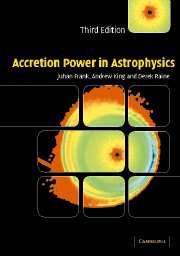Book contents
- Frontmatter
- Contents
- Preface to the first edition
- Preface to the second edition
- Preface to the third edition
- 1 ACCRETION AS A SOURCE OF ENERGY
- 2 GAS DYNAMICS
- 3 PLASMA CONCEPTS
- 4 ACCRETION IN BINARY SYSTEMS
- 5 ACCRETION DISCS
- 6 ACCRETION ON TO A COMPACT OBJECT
- 7 ACTIVE GALACTIC NUCLEI
- 8 ACCRETION DISCS IN ACTIVE GALACTIC NUCLEI
- 9 ACCRETION POWER IN ACTIVE GALACTIC NUCLEI
- 10 THICK DISCS
- 11 ACCRETION FLOWS
- Appendix: Radiation processes
- Problems
- Bibliography
- Index
3 - PLASMA CONCEPTS
Published online by Cambridge University Press: 05 June 2012
- Frontmatter
- Contents
- Preface to the first edition
- Preface to the second edition
- Preface to the third edition
- 1 ACCRETION AS A SOURCE OF ENERGY
- 2 GAS DYNAMICS
- 3 PLASMA CONCEPTS
- 4 ACCRETION IN BINARY SYSTEMS
- 5 ACCRETION DISCS
- 6 ACCRETION ON TO A COMPACT OBJECT
- 7 ACTIVE GALACTIC NUCLEI
- 8 ACCRETION DISCS IN ACTIVE GALACTIC NUCLEI
- 9 ACCRETION POWER IN ACTIVE GALACTIC NUCLEI
- 10 THICK DISCS
- 11 ACCRETION FLOWS
- Appendix: Radiation processes
- Problems
- Bibliography
- Index
Summary
Introduction
Whenever we need to consider the behaviour of a gas on lengthscales comparable to the mean free path between collisions, we must use the ideas of plasma physics. In this chapter we shall briefly introduce some of the concepts that will be important to our study of accretion.
A plasma differs from an atomic or molecular gas in that it consists of a mixture of two gases of electrically charged particles: an electron gas and an ion gas, with very different particle masses me and mi.
The electrons and ions interact with each other through their electrostatic Coulomb attractions and repulsions. These Coulomb forces decrease only slowly (∞ r-2) with distance and do not have a characteristic lengthscale. Thus, a plasma particle interacts with many others at any one instant, and this makes the description of collisions more complicated than in atomic or molecular gases, where the interparticle forces are very short-range. A further complication arises from the great difference in particle masses me and mi. Since collisions between particles of very different masses can transfer only a small fraction of the kinetic energy of order me/mi ≪ 1, it is possible for electrons and ions to have significantly different temperatures over appreciable timescales. These two properties – the long-range nature of the Coulomb force and the disparity in electron and ion masses – give the physics of plasmas its particular character. A further series of complex phenomena occurs when the plasma is permeated by a large-scale magnetic field; this is particularly relevant for the study of gas accreting on to highly magnetized neutron stars and white dwarfs.
- Type
- Chapter
- Information
- Accretion Power in Astrophysics , pp. 23 - 47Publisher: Cambridge University PressPrint publication year: 2002
- 1
- Cited by



